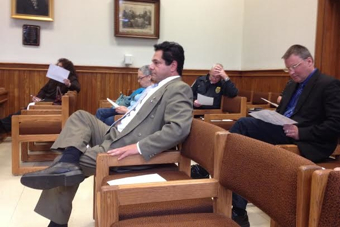 Ansonia’s Board of Apportionment and Taxation on Monday (May 19) finalized a 2014 – 2015 budget that will deliver a slight tax decrease to residents while also giving nearly $900,000 in new funding to the city’s school system.
Ansonia’s Board of Apportionment and Taxation on Monday (May 19) finalized a 2014 – 2015 budget that will deliver a slight tax decrease to residents while also giving nearly $900,000 in new funding to the city’s school system.
And if Mayor David Cassetti has his way, it’s the last spending plan the unelected tax board will ever lay its hands on.
By The Numbers
The budget totals $61,385,323, and would deliver a mill rate of 38.61.
The mill rate is currently 39.34.
The decrease amounts of .73 mill, or about 1.9 percent.
That means for the owner of a house assessed at $150,000, property taxes would decrease about $109.
Meanwhile, overall spending would increase $298,895 year over year, or about .5 percent.
Article continues after a copy of the budget.
Ansonia 2014 – 2015 Budget Summary
What A Difference A Year Makes
This year’s budget process was marked by none of the acrimony of last year’s, during which parents and educators pleaded with the tax board to give the school district more funding than its members initially planned.
The tax board — whose members are appointed, not elected — did just that, voting to provide a $1 million increase in school funding as part of a spending plan that totaled $61 million.
The budget that resulted — combined with a state-mandated revaluation that saw real estate values citywide nosedive — meant a tax hike that gave Ansonia the ninth highest mill rate in the state.
Cassetti and other Republicans feasted on the issue, making reform of the city’s budget process one of the main planks of their campaign, and vowed to use the charter revision process to abolish the tax board.
Their critique — why should the city’s elected officials be absolved from responsibility when it comes to one of the most important functions of government?
Cassetti reiterated that viewpoint after Monday’s meeting, saying he hopes it’s the last time the tax board handles the city’s budget.
“We’re working with an antiquated system,” he said.
Last November voters approved one modification — a referendum if a budget called for tax increase of 3 percent or more.
Cassetti said Monday he wants to see more changes, in the form of a system where the mayor and a finance director work with department heads to present a budget recommendation, with the city’s elected Aldermen having the final say on the numbers.
Former Tax Board Member: ‘We’re Going To Be Running Into Trouble’
Still, Monday’s meeting wasn’t without criticism.
Karl Williams, a former member of the tax board, rose during the meeting’s public session and commended members for doing a “very difficult” job, but said the tax decrease they were giving residents came principally by counting $550,000 of the city’s fund balance as revenue.
On Monday one member of the tax board, Jacques Veillette, voted against using the fund balance money as revenue.
“If we keep taking (money) out, we’re going to be running into trouble pretty quickly,” Williams said.
The budget proposal Aldermen passed to the tax board in January also relied on using $550,000 of the fund balance as revenue.
As the Valley Indy reported then, officials conceded they can’t make borrowing from the fund balance a yearly occurrence, but said the city has more than 10 percent of its annual budget in its fund balance, which will keep Ansonia in the good graces of credit ratings agencies.
Cassetti said Monday this year’s withdrawal from the fund balance was a one-time thing.
“Next year I’m going to replace the fund balance,” the mayor said. “I have more tax revenue coming in and we’re going to be able to replace that money, that’s what the game plan is.”
Schools, Police
Still up in the air is exactly what the budget passed Monday will mean for the city’s schools and police department.
Under the budget passed Monday, the school district received a total of $28,897,207, a year-over-year increase of $897,207, or 3.2 percent.
The school board had requested nearly $1 million more than that.
At a public hearing last week Schools Superintendent Carol Merlone thanked city officials for doing their best to support the school district, but said afterward the spending plan would mean layoffs for the school system.
Merlone said after Monday’s meeting that she’ll recommend cuts to members of the Board of Education at their next meeting.
“It’ll be across the board to every school,” she said.
Meanwhile, the police department will receive $5,722,165, a decrease of $128,867, or 2.2 percent, year over year.
After the budget passed by Aldermen had proposed cutting police funding by about 5 percent, police officials raised concerns that they’d have to lay off nine crossing guards and a part-time records clerk.
Click here for a previous story.
The slight bump from the tax board means only four crossing guards and a records clerk are now on the chopping block, Cassetti said this month.
After Monday’s meeting Police Chief Kevin Hale said the department is still trying to avoid any layoffs.
“What’s been approved tonight would mean the elimination of those positions,” Hale said. “However, we’re still working with the mayor on alternative ways to keep those positions.”
Hale pointed out that the department is not filling two vacant officer positions next year in an effort to save money.
He said there are also a number of possible retirements next year that could change the numbers, and since crossing guards aren’t on duty until school starts, officials have until late August to look for a solution.
“We do have a little bit of time, and there may be some ways to do this creatively and save all the positions,” the chief said.